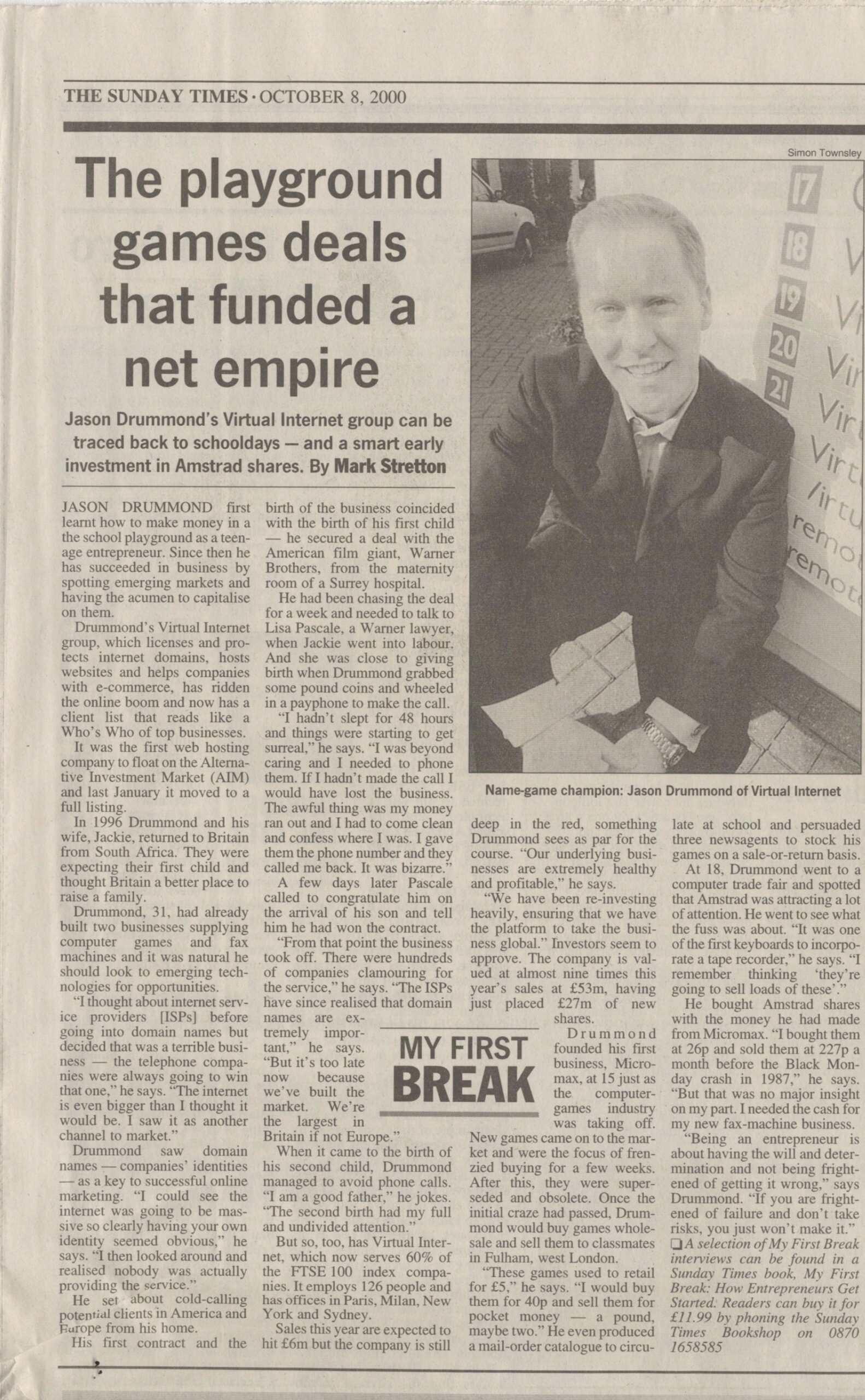JASON DRUMMOND first learnt how to make money in a the school playground as a teenage entrepreneur. Since then he has succeeded in business by spotting emerging markets and having the acumen to capitalise on them. Drummond’s Virtual Internet group, which licenses and protects internet domains, hosts websites and helps companies with e-commerce, has ridden the online boom and now has a in client list that reads like a Who’s Who of top businesses. It was the first web hosting company to float on the Alternative Investment Market (AIM) and last January it moved to a full listing. In 1996 Drummond and his wife, Jackie, returned to Britain from South Africa. They were expecting their first child and thought Britain a better place to raise a family. Drummond, 31, had already built two businesses supplying computer games and fax machines and it was natural he should look to emerging technologies for opportunities.
“I thought about internet service providers [ISPS] before going into domain names but decided that was a terrible business the telephone companies were always going to win that one,” he says. “The internet is even bigger than I thought it would be. I saw it as another channel to market.” Drummond saw domain names – companies’ identities his – as a key to successful online marketing. “I could see the Internet was going to be massive so clearly having your own identity seemed obvious,” he says. “I then looked around and realised nobody was actually the providing the service.” He set about cold-calling potential clients in America and Europe from his home.
His first contract and the birth of the business coincided with the birth of his first child he secured a deal with the American film giant, Warner Brothers, from the maternity room of a Surrey hospital. He had been chasing the deal for a week and needed to talk to Lisa Pascale, a Warner lawyer, when Jackie went into labour. And she was close to giving birth when Drummond grabbed some pound coins and wheeled in a payphone to make the call. “I hadn’t slept for 48 hours and things were starting to get surreal,” he says. “I was beyond caring and I needed to phone them. If I hadn’t made the call I would have lost the business. The awful thing was my money ran out and I had to come clean and confess where I was. I gave them the phone number and they called me back. It was bizarre.” A few days later Pascale called to congratulate him on the arrival of his son and tell him he had won the contract. “From that point the business took off. There were hundreds of companies clamouring for the service,” he says. “The ISPs have since realised that domain names are extremely important,” he says. MY “But it’s too late because BREAK now we’ve built the market. We’re the largest in Britain if not Europe.” When it came to the birth of his second child, Drummond managed to avoid phone calls. “I am a good father,” he jokes. “The second birth had my full and undivided attention.” But so, too, has Virtual Internet, which now serves 60% of in the FTSE 100 index companies. It employs 126 people and for has offices in Paris, Milan, New York and Sydney.
Sales this year are expected to hit £6m but the company is still deep in the red, something late Drummond sees as par for the three course. “Our underlying businesses are extremely healthy and profitable,” he says. “We have been reinvesting that heavily, ensuring that we have of the platform to take the business global.” Investors seem to of the approve. The company is valued at almost nine times this year’s sales at £53m, having just placed £27m of new shares.
Drummond founded his first business, Micromax, at 15 just as the computer games industry was taking off. New games came on to the market and were the focus of fren- zied buying for a few weeks. After this, they were superseded and obsolete. Once the initial craze had passed, Drummond would buy games wholesale and sell them to classmates in Fulham, west London. “These games used to retail for £5,” he says. “I would buy them for 40p and sell them for pocket money a pound, maybe two.” He even produced a mail-order catalogue to circulate at school and persuaded three newsagents to stock his games on a sale-or-return basis. At 18, Drummond went to a computer trade fair and spotted that Amstrad was attracting a lot of attention. He went to see what the fuss was about. “It was one of the first keyboards to incorporate a tape recorder,” he says. “I remember thinking ‘they’re going to sell loads of these’.” He bought Amstrad shares with the money he had made from Micromax. “I bought them at 26p and sold them at 227p a month before the Black Monday crash in 1987,” he says. “But that was no major insight on my part. I needed the cash for my new fax-machine business. “Being an entrepreneur is about having the will and determination and not being frightened of getting it wrong,” says Drummond. “If you are frightened of failure and don’t take risks, you just won’t make it.”

Leave a Reply
You must be logged in to post a comment.